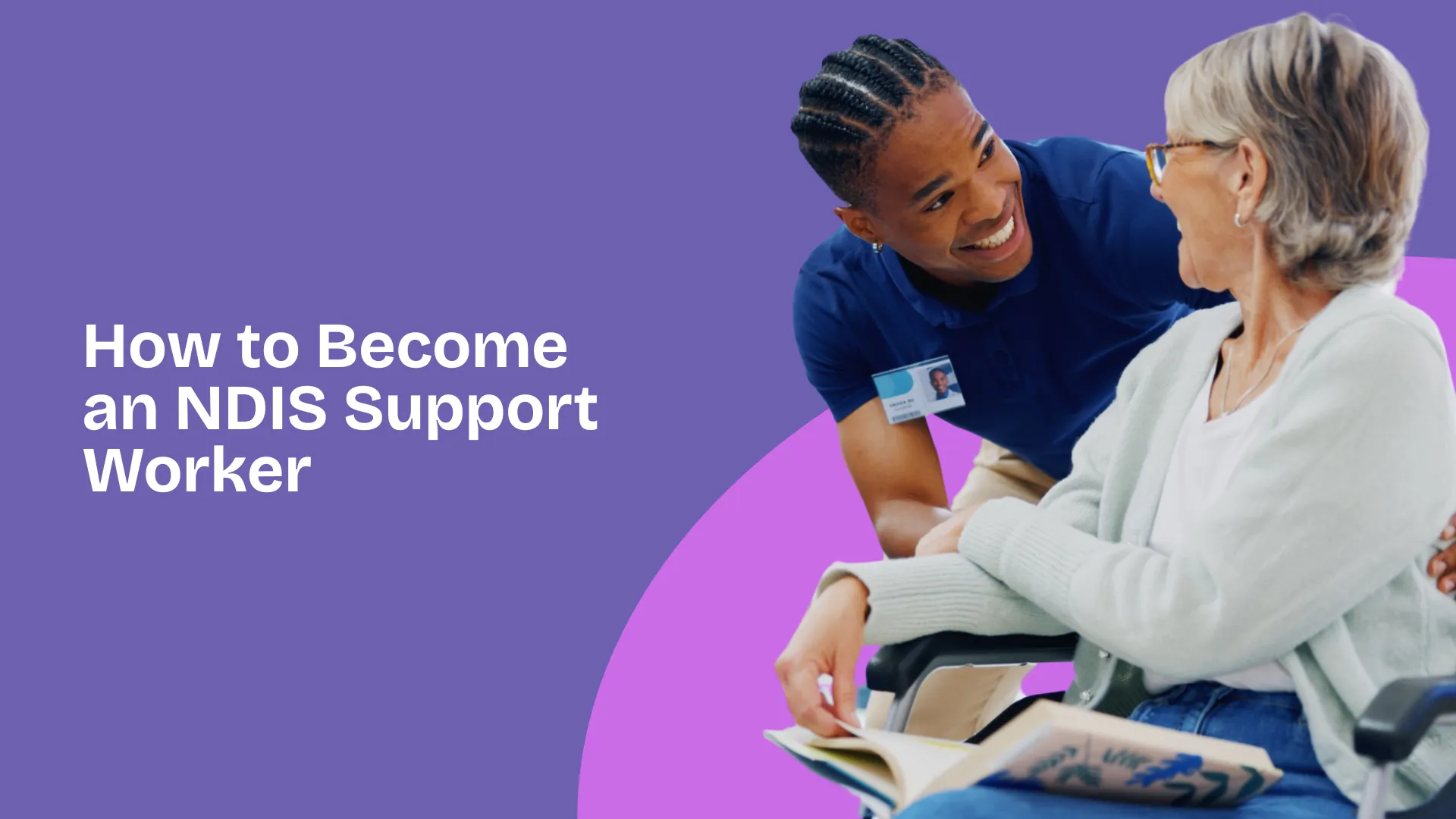Becoming an NDIS support worker is a rewarding career path that allows you to make a genuine impact in the lives of people with disability. Support workers help NDIS participants build independence, access their communities, and achieve personal goals.
The National Disability Insurance Scheme (NDIS) has created significant demand for skilled, reliable support workers across Australia. With the sector continuing to grow, becoming an NDIS support worker offers not only a stable career but also ongoing opportunities for professional development and advancement.
Starting a career in disability support involves more than just passion — it requires meeting specific qualifications, completing background checks, and developing strong communication and interpersonal skills.
1. Understand the Role of an NDIS Support Worker

Before starting your journey, it is important to clearly understand what an NDIS support worker does. Support workers assist NDIS participants with daily living, social engagement, personal development, and health management — always in ways that promote independence, dignity, and choice.
Every participant is different, which means no two support roles are exactly the same. Your work may involve helping someone attend a job interview, supporting them with personal care tasks, assisting in building new skills like using public transport, or simply offering companionship and emotional support during community outings.
The role is highly person-centred and requires flexibility, empathy, and a commitment to seeing participants as individuals with their own goals and aspirations — not just tasks to complete.
Key Responsibilities of an NDIS Support Worker
- Help participants with personal care tasks such as bathing, grooming, dressing, eating, and mobility support.
- Assist with household tasks including cleaning, laundry, shopping, menu planning, and meal preparation to maintain a safe and healthy living environment.
- Help participants engage in social activities, attend appointments, join community events, and develop hobbies and interests.
- Build strong relationships based on trust, empathy, and respect. Provide emotional support and encouragement to promote participant wellbeing.
- Support participants to build practical life skills such as budgeting, using public transport, cooking, and managing daily routines independently.
- Observe and report changes in participants’ health, behaviour, or emotional wellbeing to appropriate teams or family members when required.
- Complete notes, incident reports, and communication logs as part of daily responsibilities to ensure quality and consistency of care.
- Follow organisational protocols to respond safely and effectively to any emergencies involving participants during support activities.
2. Complete a Relevant Qualification

Most NDIS providers prefer support workers who have completed a formal qualification. While it is possible to enter the sector without one, holding a recognised certificate makes you much more employable and prepares you to deliver safe, quality support.
The two main qualifications for disability support work are:
- Certificate III in Individual Support (Disability): The standard entry-level course that covers personal care, supporting independence, and working within NDIS guidelines.
- Certificate IV in Disability: A more advanced qualification ideal for workers who want to take on greater responsibilities or specialise in complex support needs.
As part of these courses, you will complete 120–160 hours of mandatory placement, gaining real-world experience under supervision. Placement is a critical part of training and is required for you to graduate.
Courses are available through TAFEs and Registered Training Organisations (RTOs) across Australia, with flexible options like online learning and part-time study often available.
Related: How much does it cost to become an NDIS provider?
3. Obtain Required Checks and Certifications

Before you can start working as an NDIS support worker, you must complete several checks and certifications to meet legal and employer requirements. These checks help ensure the safety and wellbeing of participants.
Here’s what you will typically need:
- National Police Check: Confirms you do not have a criminal history that would prevent you from working with vulnerable people.
- Working with Children Check: Required if you will support participants under 18 years old. This check varies by state or territory.
- NDIS Worker Screening Check: Some roles require this specific check to confirm your suitability to work within the NDIS system.
- First Aid and CPR Certification: Most employers expect you to hold a current First Aid certificate and a valid CPR qualification.
It’s a good idea to organise these checks early, as some can take several weeks to process. Keeping digital and printed copies ready will make your job applications faster and smoother.
4. Ensure Vaccinations Are Up to Date

Many NDIS providers require disability support workers to meet vaccination requirements to protect participants, especially those who may be medically vulnerable.
Here’s what you may need:
- COVID-19 Vaccination: Most employers require proof of full COVID-19 vaccination and booster doses, in line with government health guidelines.
- Influenza Vaccination: Some employers, particularly those in residential care or working with high-risk participants, require an annual flu shot.
Keep your vaccination records updated and readily available, as most employers will ask for proof during recruitment or onboarding.
5. Get a Driver’s License (If Needed)

While not mandatory for all roles, having a valid driver’s license significantly increases your job opportunities as an NDIS support worker. Many participants require transport to appointments, community events, or daily activities, and providers often prefer workers who can drive.
Here’s why a driver’s license is important:
- Greater Flexibility: You can support participants with community access, shopping trips, or medical appointments.
- More Job Offers: Many providers list a driver’s license as a preferred or required skill in job ads.
- Participant Choice: Being able to transport participants offers more personalised and flexible support.
If you do not already have a license, consider obtaining one before or during your training to make yourself more competitive in the job market.
Related: What disabilities are covered by the NDIS?
6. Prepare a Professional Resume

A well-prepared resume shows employers that you are serious, qualified, and ready to work as an NDIS support worker. It should clearly highlight your training, skills, and commitment to participant-centred support.
Key elements to include:
- Qualifications: List your Certificate III or IV, including the completion of placement hours.
- Certifications: Mention your National Police Check, Working with Children Check, First Aid, CPR, and any other relevant clearances.
- Skills: Focus on soft skills such as empathy, communication, problem-solving, and working independently or as part of a team.
- Placement or Work Experience: Briefly outline the tasks you completed during your work placement, highlighting real-world experience.
- Personal Statement: Write a short, genuine statement about your passion for disability support and commitment to the NDIS principles.
Tailor your resume to match the requirements listed in each job advertisement and keep it professional, clear, and easy to read.
Related: How Much is the Disability Support Pension (DSP) in Australia?
7. Apply for Support Worker Positions

Once you have your qualifications, certifications, and resume ready, you can start applying for NDIS support worker jobs. Focus on finding roles that match your skills, interests, and availability.
Where to look for jobs:
- NDIS Providers: Apply directly to registered providers who offer disability support services in your area.
- Specialist Job Boards: Websites like CareCareers, EthicalJobs, and Kynd specialise in disability sector jobs.
- General Job Sites: Platforms like Seek, Indeed, and Jora often list support worker roles Australia-wide.
- Independent Platforms: Consider registering with platforms like Mable if you want to work as an independent contractor.
When applying:
- Tailor your resume and cover letter to each role
- Highlight your placement experience, skills, and commitment to person-centred care
- Prepare for interviews by understanding NDIS principles and the Code of Conduct
Applying consistently and following up professionally can help you secure your first role and start building your career in disability support.
Related: How to Become an NDIS Support Coordinator
8. Commit to Professional Development

Starting your career as an NDIS support worker is just the beginning. To deliver high-quality support and grow in the disability sector, ongoing learning and professional development are essential.
Ways to continue building your skills:
- Attend Workshops and Training Sessions: Many providers offer regular training on topics like safe manual handling, complex care, and communication strategies.
- Complete Short Courses: Extra qualifications in mental health, behaviour support, or aged care can open up more job opportunities.
- Stay Updated with NDIS Changes: Keep informed about updates to the NDIS framework, participant rights, and best practice standards.
- Seek Feedback: Use feedback from supervisors and participants to improve your practice and strengthen your professional skills.
Commitment to learning not only makes you a better support worker but also helps you progress into leadership, coordination, or specialised roles in the future.
Final Thoughts
Becoming an NDIS support worker offers a career filled with purpose, stability, and personal growth. By completing the right qualifications, organising the necessary checks, and building strong practical skills, you can start making a real difference in the lives of people with disability.
The disability sector continues to grow across Australia, creating strong demand for skilled and passionate support workers. Whether you are new to the workforce or transitioning from another field, the steps you take today — from training to job applications — can lead to a fulfilling and meaningful career.
Commit to ongoing learning, stay true to participant-centred values, and embrace the opportunity to support people in living their best lives. Every interaction you have as a support worker helps to build more inclusive, empowered communities.
